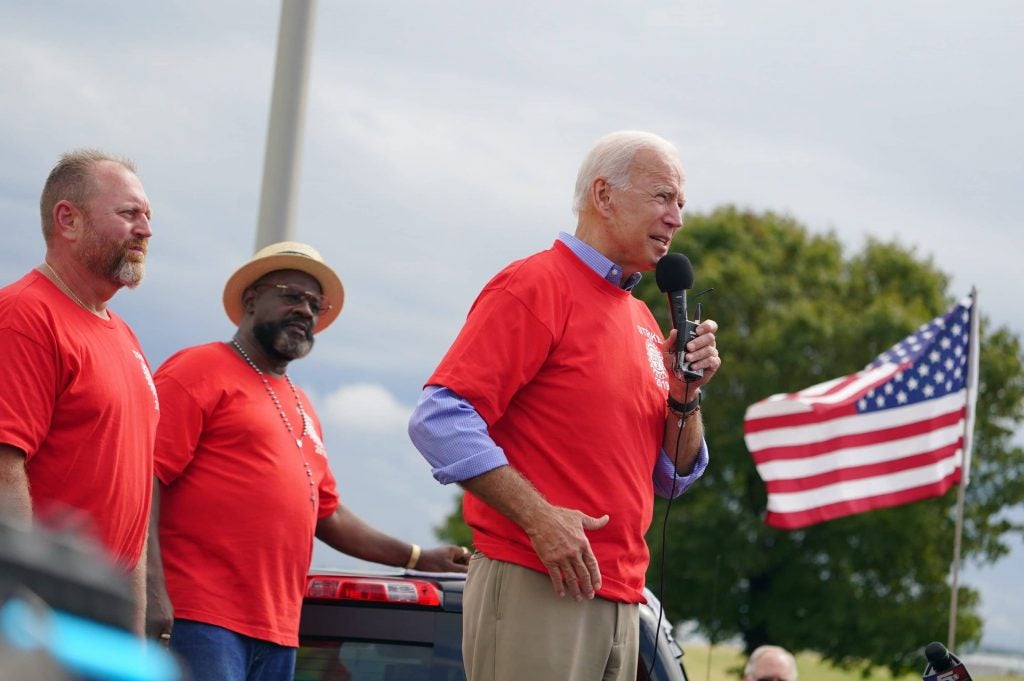With a strike against one or more of Detroit’s Big Three automakers seeming ever more likely, the economic impact of even just a 10-day walkout could top $5 billion as it spreads out across the country, according to a new study.

Workers alone would lose about $859 million in wages, the Anderson Economic Group warned during a presentation to the Automotive Press Association Thursday morning. But the overall effects of a walkout would be felt across the U.S. economy, the consulting firm said, with consumers, dealers, suppliers and others impacted.
“Even a short strike would impact economies throughout Michigan and across the nation,” said Patrick Anderson, AEG’s senior analyst and CEO.
Consumers could quickly feel the pinch
Several factors could worsen the effects of even a short strike this year, AEG analysts noted. For one thing, dealers are still struggling to rebuild vehicles inventories that had been largely depleted during the early days of the COVID pandemic and subsequent shortages of semiconductor chips.
At the beginning of this year, there were only about 1 million vehicles on dealer lots, a third of what is considered normal. Inventories have been building back up but are still below normal, according to industry data.
Separately, consumers have begun returning to showrooms, resulting in significant year-over-year increases in sales for the last several months. A strike that impacts production could shutdown that sales rebound.
“Consumer and dealer losses are typically somewhat insulated in the event of a very short strike,” said Tyler Theile, vice president at AEG. “However, with current inventories hovering around only 55 days, (with the industry norm at or about 65), the industry looks different than it did in during the last UAW strike.” She added that automakers now have “about one-fifth of the inventory that was on-hand in 2019, so a strike in current conditions would likely affect dealers and customers much sooner.”
Seven hundred demands

The UAW began negotiating separate contracts with each of the Detroit manufacturers, General Motors, Ford and Stellantis, last month, with a deadline of Sept. 14 when existing agreement expires.
Union officials, led by new UAW President Sean Fain, have laid down a list of more than 700 demands. Some touch on minor issues at individual plants, but the more significant ones seek major increases in wages and benefits, including the restoration of defined benefits. By some preliminary estimates, these would bring labor costs up to as much as $100 per hour. The union also is seeking substantial increases in time off that would effectively shift to a 32-hour work week.
Automakers have expressed willingness to up pay and benefits but appear to be balking at the full extent of the union’s demands. The companies have also laid out demands, among other things seeking to reduce unplanned absenteeism.
A hard line
Fain has taken a hard line from the time he was unexpectedly elected to replace the former UAW president early this year. He has referred to the automakers as “the enemy,” and more recently responded to a proposed settlement from Stellantis by tossing it into a garbage can in front of reporters.

He and other union officials have repeatedly warned that they would be willing to take a strike. And the UAW has nearly $900 million in its strike fund to prop up members if they do walk out.
The last time the domestic manufacturers were hit by a strike was in 2019, hourly workers manning the picket lines outside General Motors for nearly six weeks. That cost GM $10.7 billion in lost revenue and $3.6 billion in profits — about $2 a share, the company reported in its third-quarter earnings statement.
Bad timing
Looking forward to the possibility of a shorter, 10-day strike against one of the three manufacturers this year, Anderson said in a statement this “would result in total wage losses of $859 million and manufacturer losses of $989 million. If only one automaker suffered a strike-related shutdown (Ford, for example), it could cause $665 million in losses during that period. In this scenario, AEG estimates a $341 million loss in direct wages and $325 million in company-wide losses.”
The timing of the talks could prove critical to a U.S. economy that many analysts have warned is bordering on recession. According to automotive trade group data, every direct job in the auto industry indirectly impacts another 11 American jobs. There currently are about 140,000 U.S. hourly workers at GM, Ford and Stellantis.
The broader impact of a strike has also created concerns at the White House. President Joe Biden has frequently campaigned as “Union Joe,” and has expressed strong support for the right to organize and, if need be, to strike.
But a walkout that hurt the overall economy would pose a potential drag on his campaign for a second White House term. Biden has sent a senior advisor to Detroit to remain close to the talks.
- SEO Powered Content & PR Distribution. Get Amplified Today.
- PlatoData.Network Vertical Generative Ai. Empower Yourself. Access Here.
- PlatoAiStream. Web3 Intelligence. Knowledge Amplified. Access Here.
- PlatoESG. Automotive / EVs, Carbon, CleanTech, Energy, Environment, Solar, Waste Management. Access Here.
- PlatoHealth. Biotech and Clinical Trials Intelligence. Access Here.
- ChartPrime. Elevate your Trading Game with ChartPrime. Access Here.
- BlockOffsets. Modernizing Environmental Offset Ownership. Access Here.
- Source: https://www.thedetroitbureau.com/2023/08/10-day-uaw-strike-could-cause-over-5-billion-in-economic-losses/
- :has
- :is
- $3
- $UP
- 000
- 1
- 11
- 14
- 2019
- 65
- 7
- 700
- a
- About
- According
- across
- added
- advisor
- affect
- against
- Agreement
- alone
- also
- American
- among
- an
- analyst
- Analysts
- and
- anderson
- Another
- appear
- appointed
- approval
- ARE
- around
- AS
- asked
- Association
- At
- auto
- automakers
- automotive
- back
- BE
- been
- began
- Beginning
- begun
- below
- benefits
- between
- biden
- Big
- Billion
- bring
- broader
- Building
- Bureau
- but
- by
- Campaign
- CAN
- caught
- Cause
- ceo
- Chips
- Close
- Companies
- company
- Concerns
- conditions
- considered
- consulting
- Consumers
- contracts
- Cost
- Costs
- could
- country
- Covid
- created
- critical
- Current
- Currently
- Customers
- data
- Days
- dealer
- defined
- demands
- DID
- different
- direct
- do
- Domestic
- down
- during
- each
- Early
- Earnings
- Economic
- Economic Impact
- economies
- economy
- effectively
- effects
- elected
- estimates
- Even
- Event
- EVER
- Every
- example
- existing
- expecting
- expressed
- extent
- factors
- feel
- Firm
- For
- Ford
- Former
- Forward
- frequently
- from
- front
- full
- fund
- General
- General Motors
- GM
- Group
- had
- Hard
- Have
- he
- his
- Hit
- hour
- House
- HTTPS
- hundred
- Hurt
- if
- Impact
- impacted
- Impacts
- in
- Including
- Increases
- indirectly
- individual
- industry
- into
- inventory
- issues
- IT
- ITS
- Job
- Jobs
- joe
- Joe Biden
- jpg
- just
- labor
- largely
- Last
- lately
- Led
- likely
- Line
- lines
- List
- LOOKS
- lose
- loss
- losses
- lost
- major
- Manufacturer
- Manufacturers
- many
- max-width
- Members
- Michigan
- million
- minor
- Monitor
- Month
- months
- more
- morning
- Motors
- much
- nation
- nearly
- Need
- New
- normal
- noted
- now
- of
- off
- officials
- on
- ONE
- ones
- only
- or
- Other
- Others
- out
- outside
- over
- overall
- pandemic
- patrick
- Pay
- per
- period
- plants
- plato
- Plato Data Intelligence
- PlatoData
- pose
- possibility
- potential
- presentation
- president
- president joe biden
- press
- Production
- profits
- proposed
- Prove
- quickly
- rebound
- recent
- recently
- recession
- reduce
- referred
- remain
- REPEATEDLY
- replace
- Reported
- restoration
- result
- resulting
- returning
- revenue
- right
- s
- Said
- sales
- scenario
- Sean
- Second
- Seek
- seeking
- semiconductor
- senior
- Senior Advisor
- sent
- separate
- settlement
- several
- Share
- shawn
- she
- shift
- Short
- shortages
- shutdown
- sign
- significant
- SIX
- So
- some
- somewhat
- Speaks
- Spreads
- Statement
- Still
- stream
- strike
- strong
- Struggling
- Study
- subsequent
- substantial
- suffered
- suppliers
- support
- Take
- taken
- Talks
- term
- than
- that
- The
- There.
- These
- they
- thing
- things
- Third
- this
- this week
- this year
- three
- throughout
- thursday
- time
- timing
- to
- top
- Total
- touch
- trade
- tyler
- typically
- u.s.
- U.S. economy
- union
- upcoming
- Vehicles
- very
- vice
- Vice President
- Vote
- wage
- wages
- was
- week
- Weeks
- WELL
- were
- What
- What is
- when
- white
- White House
- willing
- Willingness
- with
- Work
- workers
- worsen
- would
- year
- zephyrnet












